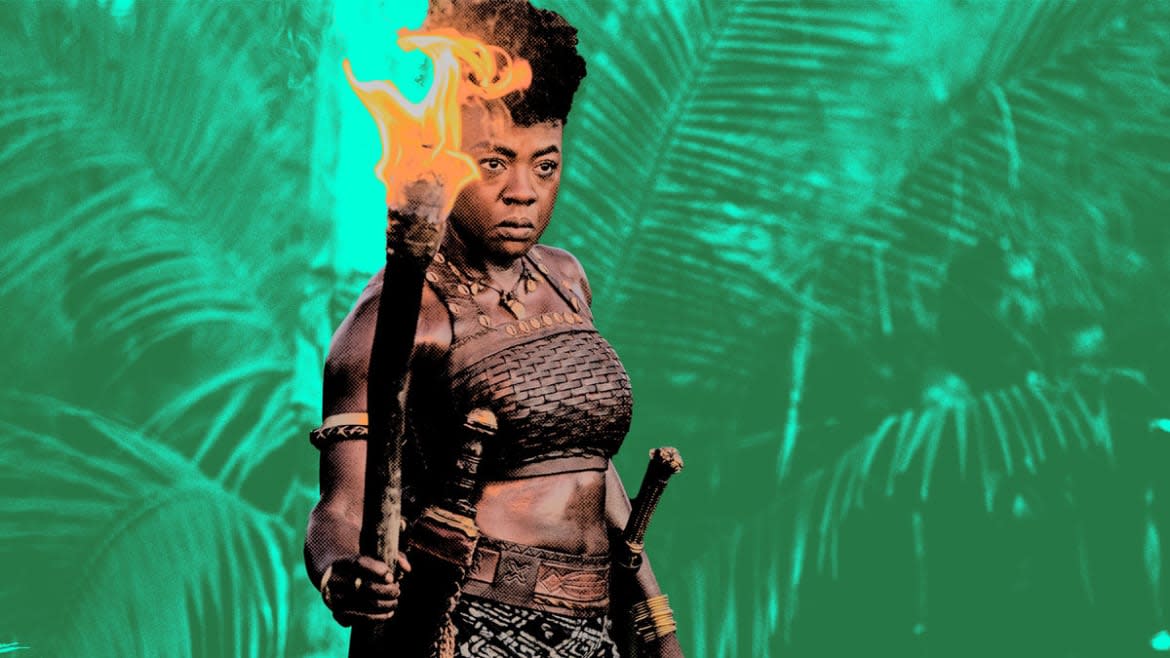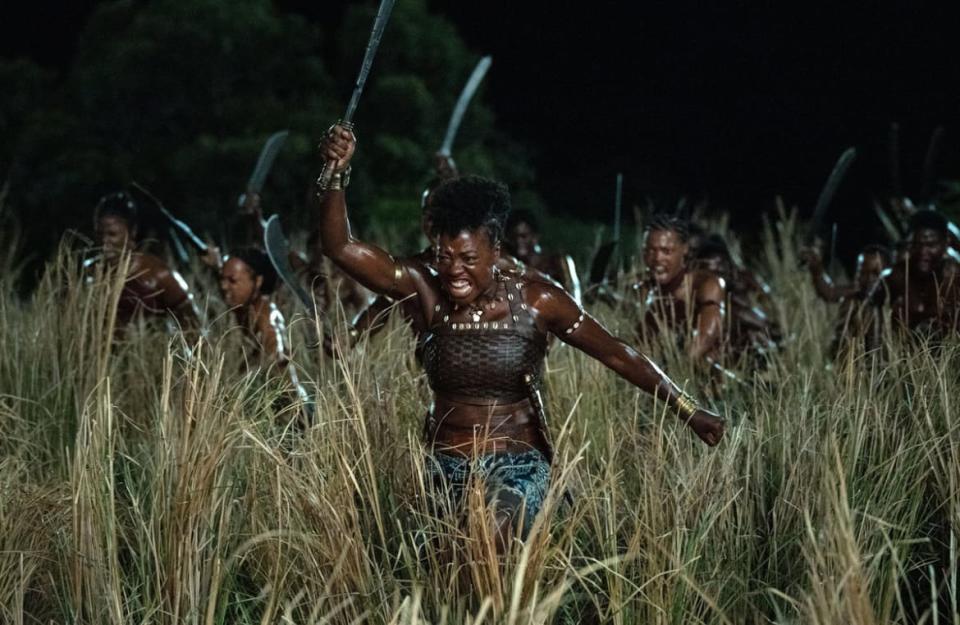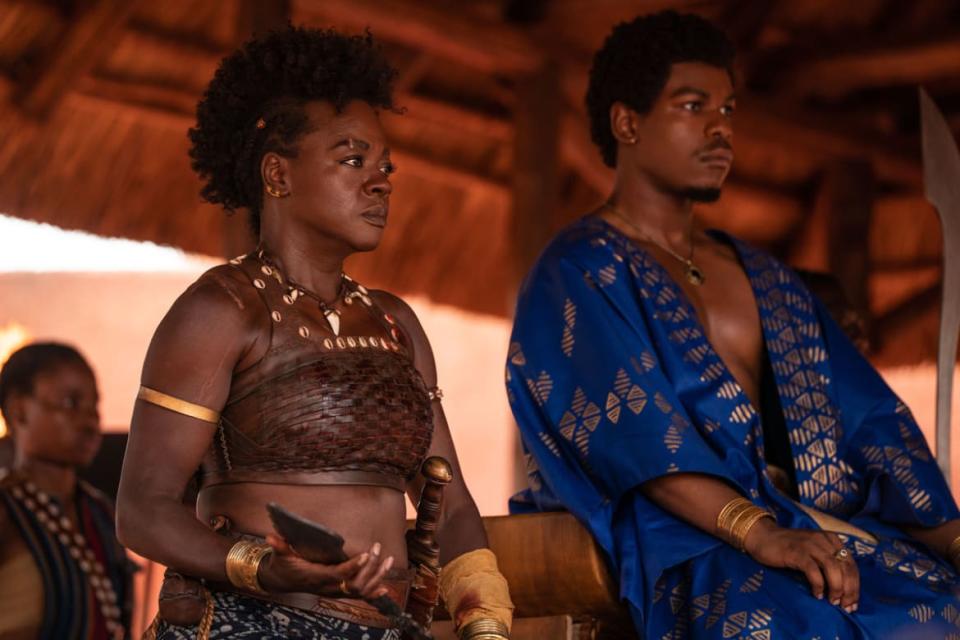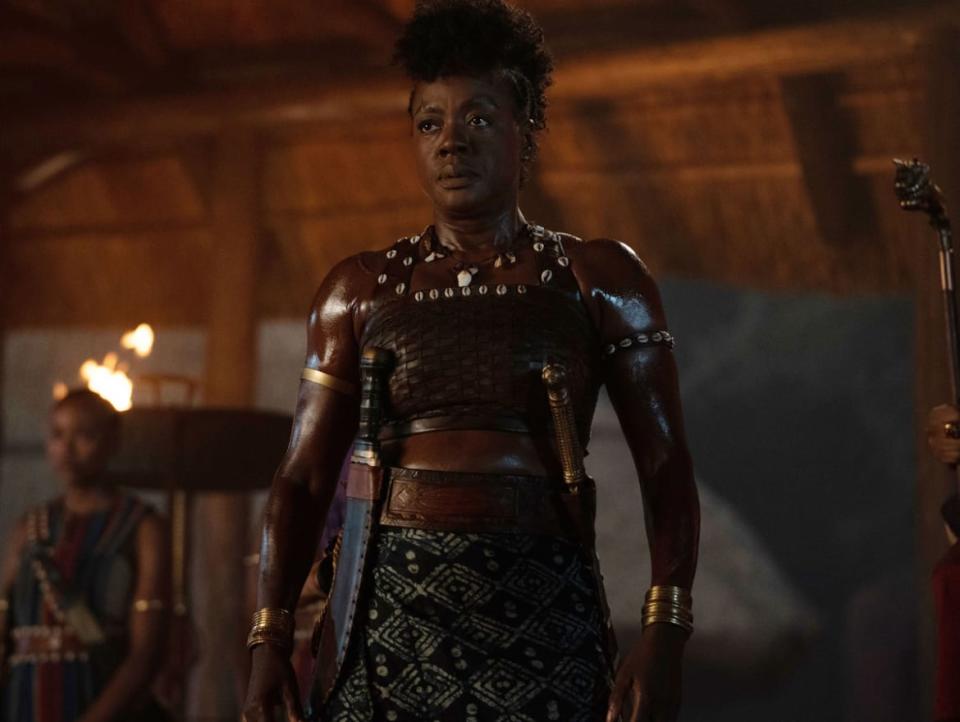Viola Davis and Her Lady Warriors Will Blow You Away in ‘The Woman King’

- Oops!Something went wrong.Please try again later.
- Oops!Something went wrong.Please try again later.
Viola Davis, Lashana Lynch, John Boyega, Gina Prince-Bythewood—when you put a handful of powerhouses like these folks together, of course you’re going to get a complete tour de force of an action film like The Woman King.
It should come as no surprise that The Woman King is an absolute blast of a cinematic experience (again, just look at those names, watch the trailer, that’s all you need to know). But the movie still manages to exceed expectations: The action sequences are choreographed so brilliantly, as if these warriors were members of Cirque du Soleil, but the deeper contextual arcs layered into them make The Woman King worth writing home about. On top of being a whirlwind action film, The Woman King is also a family drama, a historical film, and an underdog story, all with a tinge of romance.

We get a Star Wars-inspired scrawl at the start of the film to lay the groundwork, but it’s fairly easy to pick up on the issues at hand from the start. It’s 1823, and the West African Kingdom of Dahomey has been participating in the slave trade to stay afloat; because of this, Dahomey is constantly under siege by the neighboring Oyo Tribe, which also benefits from the trade. But under new leadership of King Ghezo (Boyega), the kingdom hopes to remove itself from the trade and sell its palm oil instead. Still, the Oyo Tribe is relentless, demanding innocent Dahomey citizens to put up for trade or face its wrath. Dahomey is stuck.
Enter the Agojie, a fiery women army led by the wise Nanisca (Davis) and dexterous Izogie (Lynch). Though they’ve spent the last few years hunting for prisoners to contribute to the Portuguese slave trade, Nanisca has had enough. Despite ruffling some feathers with the King’s royal circle of wives, she pleads with him to consider stepping away from the trade. With an army as tough as the Agojie—they gouge eyes out with their nails, spin kickflips around massive brutes of men, and can still happily dance together at the end of the day—defeating the Oyo Tribe shouldn’t be a major issue.
On top of the Dahomey vs. Oyo clash, which is high drama in and of itself, we also get a look into the intense training of the Agojie soldiers. Nawi (The Underground Railroad’s Thuso Mbedu) refuses to lose her fierce independence to a much older, misogynistic husband, so her adoptive father offers her to King Ghezo’s military. That’s no problem. Nawi, now 19, has dreamed about becoming a member of the Agojie since she was a child.

Agojie training is intense, to say the least. Imagine throwing yourself into a tangle of thorns, slicing up your skin, only to then scale a 20-foot-tall wall and fight a hulk on the other side. This is just practice! But it’s fun to root for plucky Nawi while also pulling for Nanisca, the Agojie, and Dahomey’s exit from the slave trade. There are, of course, many exciting payoffs to celebrate along the way.
My theater held back no cheer, no applause, no “AH!” reaction as they watched the film. Movies like The Woman King make a venture to the theater worth every minute. Seeing Viola Davis slit the throat of greedy men on the big screen? Count me in. I’ll clap and cheer the whole time, and even give a standing ovation at the end. (But don’t walk out right after—there’s a brief, gorgeous end-credit scene you’ll want to catch.)
Though this is Viola Davis’ movie, Lashana Lynch runs away with some of the best scenes. From the opening, in which she shoves her sharpened fingernails into a man’s eyeballs, she’s the action goddess. “Pop out the eyeballs,” she explains to Nawi early in the film, “and the fight is over.” She’ll take down a man in seconds and smile the whole time she’s executing him. Izogie is an absolute hoot, too, joking that the white man’s only positive contribution to society is whiskey. Lynch is clearly the perfect candidate for James Bond’s 007 title.
What seals the deal on The Woman King is that the Agojie were a real troupe of warriors (who actually inspired the Dora Milaje warriors in Black Panther) that took down the Oyo Tribe in the 1800s. The Woman King immerses audience in thick layers of history in West Africa, where the issue of the slave trade is too complex to explain without seeing every side of the story. We meet the traders, the Oyo Tribe, the victims being traded away, and as many folks in the Dahomey Kingdom as possible. No stone is left unturned in The Woman King.

The best moments by far, though, are any that focus on the tight bond shared between fellow Agojie warriors. They are sisters, brought together by their love of the craft and their passion for protecting each other. It is a pleasure to watch them dance together, perfect their skills together, and enter battle together as one momentous group of power—all held together by Viola Davis, who shines like the legend she is.
It’s a true cinematic miracle when films like The Woman King come around: so full of heart, satisfying action, and bold feminist roots, all packed into one tightly woven film. Getting to witness it in theaters too? That’s the Agojie’s biggest win of all.
Get the Daily Beast's biggest scoops and scandals delivered right to your inbox. Sign up now.
Stay informed and gain unlimited access to the Daily Beast's unmatched reporting. Subscribe now.

